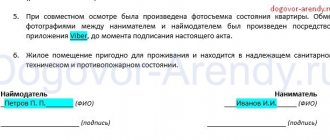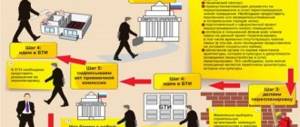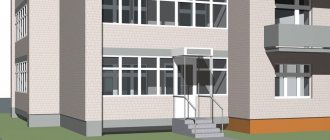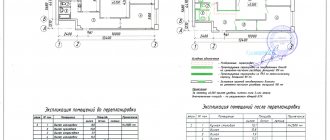Category: Apartment redevelopment
Anyone who has decided to remodel an apartment is faced with an important question: is it possible to independently coordinate the redevelopment of an apartment? The honest answer to this is that despite all the difficulties, you can independently coordinate the redevelopment of an apartment! Especially for this, we have prepared for you detailed step-by-step instructions “How to independently approve the redevelopment of an apartment.”
In the instructions you will find:
— General scheme and individual stages of approving the redevelopment of an apartment
— Terms of approval
— Lists of required documents
— List of authorities and organizations where redevelopment needs to be approved
— Sequence of actions at each stage
— Possible difficulties and risks
— Important information you should know
— Our useful tips and recommendations
For your convenience, we have posted the entire instructions on this page in text form.
The redevelopment approval procedure consists of 5 stages:
— Development of a redevelopment project for your apartment
— Coordination of the redevelopment project
— Re-measurement of the apartment by a cadastral engineer after repairs are completed
— Putting the apartment into operation after renovation
— Registration of redevelopment (amending the USRN information)
What to do after accepting the completed redevelopment of the apartment? Detailed description of other stages
- A special commission carries out the acceptance of repair and construction work in the apartment.
- The act of completed work is signed.
- An engineer from the BTI is invited and measurements of the modified room are taken.
- A new technical passport is issued.
- An application with a package of documents is submitted to Rosreestr or MFC to make changes to the Unified State Register and receive an extract.
Many property owners often calmly engage in the arrangement and redevelopment of their apartments and do not intend to document everything until a certain point. But such illegal redevelopment could turn into a big problem in the future.
What is redevelopment and why approve it?
The essence of the concept of “redevelopment” regarding residential premises is revealed by Art. 25 ch. 4 editions of the RF Housing Code for 2020. This is a change in configuration achieved by interfering with the structure of the house. The latter assumes:
- Making holes and openings in load-bearing walls, piers;
- Dismantling partitions, moving and (or) installing new ones;
- Sealing door and window openings;
- Increasing the square footage of housing, dividing the area of rooms;
- Equipment of additional bathrooms, vestibules;
- Changing the purpose of premises, etc.
Since the listed “metamorphoses” can affect the interests of other residents, permission must be obtained. The event ends with the BTI making appropriate amendments to the technical documents. Avoiding compliance with legal requirements is fraught with trouble both for those who did not agree on the planned “upgrade” in advance, and for those who bought real estate that was converted without proper registration.
According to Art. 29 of the Housing Code of the Russian Federation, starting from 2020, changing the layout without approval is considered illegal and entails liability.
However, the law allows for the settlement of a conflict even after unauthorized redevelopment. Legalization is possible in two ways, which we will discuss below.
Step-by-step instructions for remodeling an apartment in a new building before obtaining ownership rights
First stage
It is necessary to carefully familiarize yourself with the data in the project declaration in order to have an approximate idea of how much area the apartment actually occupies (to obtain such information, it is necessary, among other things, to carry out all internal measurements of the premises, since without this information it is simply pointless to contact design organizations).
Second phase
It is necessary to decide what exactly you would like to see inside the apartment and, with ready-made wishes, contact the design organization, whose specialists will draw up a redevelopment project.
Third stage
Coordination of the received project with the developer and its documentation for the house. This stage must be observed, since otherwise, by the time the house is handed over, a situation may arise with “disassembly of the newly configured” due to non-recognition of changes inside the apartment as legal.
What is 214-FZ On shared construction and what guarantees of protection it provides to participants in shared construction - read here.
It is necessary to remember that, as mentioned above, even laying the floor will be considered nothing more than a redevelopment, since in the project declaration, for which the developer received a state expert opinion, there is no layered floor in the apartments, and instead there is only a concrete floor slab .
Fourth stage
The final stage is the process of implementing the planned changes (on your own or with the help of hired workers - this is at the choice of future new residents).
What is the need for redevelopment?
Unfortunately, the standard layout of modern new buildings does not always meet all the requirements and conditions for comfortable living. Among the many problems that apartment owners have to face, the following disadvantages of the standard layout can be identified:
- Relatively small usable area;
- Narrow corridors and cramped rooms;
- Combined sanitary unit and small kitchen.
It is these problems that can be solved by competent and correct redevelopment of the apartment. Its approval will allow you to legally change certain parameters of your apartment for the most comfortable and convenient stay.
Here are a few examples of effective apartment redevelopment:
- The wall separating the corridor and the room was dismantled. The non-functional corridor was removed and the wall of the room was moved 5 meters. As a result, the usable area of the room was increased to 17 square meters, and the room turned into a full-fledged hall;
- The owner of the new building redesigned one room, adding one wall with a doorway. By dividing the large room in this way, he provided himself with additional internal space with a total area of 15 square meters.
- The loggia, in accordance with the design decision, was combined with the living room, increasing it by 6.2 m2. Agree - a pretty solid expansion.
INTERESTING FACT:
Statistics show that about 72% of owners of new buildings are not satisfied with the standard layout, and they are ready to significantly change the original configuration of the living space.
How much does it cost to coordinate the redevelopment of an apartment?
Many companies tell their clients only the cost of services for coordinating an apartment redevelopment project. This means that the development of a redevelopment project, re-measurement of the apartment, obtaining an apartment commissioning certificate and registration of the redevelopment are not included in this cost . Perhaps the company does not provide such services in principle.
As you already understand, there is no standard cost for redevelopment approval. In each specific case, the company evaluates the amount of work and forms a specific amount. However, we can give several recommendations for those who want to coordinate the redevelopment of their apartment with a minimum budget.
Interesting read: Buying an apartment with a mortgage while married
Draw up a certificate of completed redevelopment of premises for previously completed work
1. The applicant has the right to file a pre-trial (extrajudicial) complaint against the decisions and (or) actions (inactions) taken (performed) in the provision of public services by the Moscow Housing Inspectorate, the State Budgetary Institution of the MFC of the city of Moscow and their officials, state civil servants of the Moscow Housing Inspectorate, and employees of the MFC.
2. The filing and consideration of complaints is carried out in the manner established by Chapter 2.1 of the Federal Law of July 27, 2010 No. 210-FZ “On the organization of the provision of state and municipal services”, the Regulations on the specifics of filing and consideration of complaints about violations of the procedure for the provision of public services in the city of Moscow , approved by Decree of the Moscow Government of November 15, 2011 No. 546-PP “On the provision of state and municipal services in the city of Moscow”, these Regulations.
3. Applicants may file complaints in the following cases:
3.1. Violation of the deadline for registering a request and other documents necessary for the provision of public services, as well as the procedure for processing and issuing a receipt for receiving documents (information) from the applicant in the cases provided for by these Regulations.
3.2. Requirements from the applicant:
3.2.1. Documents or information or the implementation of actions, the provision or implementation of which is not provided for by the regulatory legal acts of the Russian Federation and the city of Moscow for the provision of public services, including documents obtained using interdepartmental information interaction.
3.2.2. Applications for the provision of services not included in the list of services approved by the Moscow Government that are necessary and mandatory for the provision of public services.
3.2.3. Payment of fees for the provision of public services not provided for by regulatory legal acts of the Russian Federation and the city of Moscow.
3.2.4. Documents or information, the absence and (or) unreliability of which was not indicated during the initial refusal to accept documents necessary for the provision of a public service, or in the provision of a public service, except for the cases provided for in paragraph 4 of part 1 of Article 7 of the Federal Law of July 27, 2010 No. 210-FZ “On the organization of the provision of state and municipal services.”
3.3. Violations of the deadline for the provision of public services.
3.4. Refusal to the applicant:
3.4.1. In accepting documents, the submission of which is provided for by the regulatory legal acts of the Russian Federation and the city of Moscow for the provision of public services, on grounds not provided for by the regulatory legal acts of the Russian Federation and the city of Moscow.
3.4.2. In the provision of public services on grounds not provided for by the regulatory legal acts of the Russian Federation and the city of Moscow.
3.4.3. In the correction of typographical errors and errors in documents issued as a result of the provision of public services, or in case of violation of the established deadline for such corrections.
3.5. Other violations of the procedure for providing public services established by regulatory legal acts of the Russian Federation and the city of Moscow.
4. Complaints about decisions and (or) actions (inaction) of officials, state civil servants of the Moscow Housing Inspectorate are considered by the head (authorized deputy head) of the Moscow Housing Inspectorate.
Complaints about decisions and (or) actions (inaction) of the head of the Moscow Housing Inspectorate, including decisions made by him or his deputy on complaints received in a pre-trial (extrajudicial) manner, are considered by a higher executive body of the city of Moscow in accordance with paragraphs 5.6, 6 of the appendix 6 to the resolution of the Moscow Government of November 15, 2011 N 546-PP “On the provision of state and municipal services in the city of Moscow.”
Complaints about decisions and (or) actions (inaction) of MFC employees committed when providing government services in accordance with the interaction agreement concluded with the Moscow Housing Inspectorate are considered by the director (authorized deputy director) of the State Budgetary Institution of the MFC of the city of Moscow.
Complaints about decisions and (or) actions (inaction) of the director (authorized deputy director) of the State Budgetary Institution of the MFC of the city of Moscow, accepted on complaints received in a pre-trial (extrajudicial) manner, are considered by a higher executive body of the city of Moscow in accordance with paragraphs 5.6, 6 of Appendix 6 to Resolution of the Moscow Government of November 15, 2011 No. 546-PP “On the provision of state and municipal services in the city of Moscow.”
5. Complaints can be submitted to the executive authorities of the city of Moscow and organizations subordinate to them authorized to consider complaints in accordance with these Regulations (hereinafter referred to as the bodies and organizations authorized to consider complaints), in writing on paper, in electronic form in one from the following methods:
5.1. Upon personal application by the applicant (applicant’s representative).
5.2. Through MFC.
5.3. By post.
5.4. Using the official website of the Moscow Housing Inspectorate on the information and telecommunications network Internet.
6. The complaint must contain:
6.1. The name of the body (organization) authorized to consider the complaint or the position and (or) last name, first name and patronymic (if any) of the relevant official to whom the complaint is sent.
6.2. The name of the executive authority of the city of Moscow, a multifunctional center for the provision of public services, or the position and (or) surname, first name, patronymic (if any) of the official, civil servant, employee, decisions and (or) actions (inaction) of which are being appealed.
6.3. Last name, first name, patronymic (if any), information about the place of residence of the applicant - an individual, including one registered as an individual entrepreneur, or name, information about the location of the applicant - a legal entity, as well as contact telephone number(s), address (addresses) email (if available) and postal address to which the response should be sent to the applicant.
6.4. The date of submission and registration number of the request for the provision of a public service (except for cases of appealing against the refusal to accept the request and its registration).
6.5. Information about decisions and (or) actions (inactions) that are the subject of appeal.
6.6. Arguments on the basis of which the applicant does not agree with the decisions and actions (inactions) being appealed. The applicant may submit documents (if any) confirming the applicant’s arguments, or copies thereof.
6.7. Applicant's requirements.
6.8. List of documents attached to the complaint (if any).
6.9. Date of filing the complaint.
7. The complaint must be signed by the applicant (his representative). If a complaint is filed in person, the applicant (applicant's representative) must provide an identification document.
The authority of the representative to sign the complaint must be confirmed by a power of attorney issued in accordance with the regulatory legal acts of the Russian Federation.
The powers of a person acting on behalf of an organization without a power of attorney on the basis of the law, other regulatory legal acts and constituent documents are confirmed by documents certifying his official position, as well as the constituent documents of the organization.
The status and powers of legal representatives of an individual are confirmed by documents provided for by regulatory legal acts of the Russian Federation.
8. A received complaint must be registered no later than the working day following the day of receipt.
9. The maximum period for consideration of a complaint is 15 working days from the date of its registration. The period for consideration of the complaint is five working days from the date of its registration in cases of appeal by the applicant:
9.1. Refusal to accept documents.
9.2. Refusal to correct typos and errors made in documents issued as a result of the provision of public services.
9.3. Violations of the deadline for correcting typos and errors.
10. Based on the results of consideration of the complaint, a decision is made to satisfy it (in whole or in part) or to refuse satisfaction.
11. The decision must contain:
11.1. The name of the body or organization that considered the complaint, position, surname, first name, patronymic (if any) of the official who made the decision on the complaint.
11.2. Details of the decision (number, date, place of adoption).
11.3. Last name, first name, patronymic (if any), information about the place of residence of the applicant - an individual, including one registered as an individual entrepreneur, or the name, information about the location of the applicant - a legal entity.
11.4. Last name, first name, patronymic (if any), information about the place of residence of the applicant’s representative who filed the complaint on behalf of the applicant.
11.5. Method of filing and date of registration of the complaint, its registration number.
11.6. Subject of the complaint (information about the decisions, actions, or inactions being appealed).
11.7. The circumstances established during the consideration of the complaint and the evidence confirming them.
11.8. Legal grounds for making a decision on a complaint with reference to the applicable regulatory legal acts of the Russian Federation and the city of Moscow.
11.9. The decision taken on the complaint (conclusion on the satisfaction of the complaint or refusal to satisfy it).
11.10. Measures to eliminate identified violations and deadlines for their implementation (if the complaint is satisfied).
11.11. Information about the actions carried out by the executive authority of the city of Moscow, the local government body, an organization subordinate to the executive authority and the local government body that provides public services, the MFC in order to immediately eliminate identified violations in the provision of public services, as well as apologies for the inconvenience caused and information about further actions that the applicant needs to take in order to receive public services (if the complaint is satisfied).
11.12. Reasoned explanations about the reasons for the decision made (in case of refusal to satisfy the complaint).
11.13. Procedure for appealing a decision.
11.14. Signature of the authorized official.
12. The decision is made in writing using official forms.
13. The measures to eliminate identified violations specified in the decision include:
13.1. Cancellation of previously made decisions (in whole or in part).
13.2. Ensuring the acceptance and registration of the request, execution and issuance of a receipt to the applicant (in case of evasion or unreasonable refusal to accept documents and their registration).
13.3. Ensuring registration and delivery to the applicant of the result of the provision of a public service (in case of evasion or unreasonable refusal to provide a public service).
13.4. Correction of typos and errors made in documents issued as a result of the provision of public services.
13.5. Refund to the applicant of funds, the collection of which is not provided for by the regulatory legal acts of the Russian Federation and the city of Moscow.
14. The body or organization authorized to consider the complaint refuses to satisfy it in the following cases:
14.1. Recognition of the appealed decisions and (or) actions (inactions) as legal and not violating the rights and freedoms of the applicant.
14.2. Filing a complaint by a person whose powers have not been confirmed in the manner established by regulatory legal acts of the Russian Federation and the city of Moscow.
14.3. The applicant does not have the right to receive public services.
14.4. Availability:
14.4.1. A judicial act on the applicant’s complaint with identical subject matter and grounds that has entered into legal force.
14.4.2. Decisions on a complaint made earlier in a pre-trial (out-of-court) manner in relation to the same applicant and on the same subject of the complaint (except for cases of appealing previously made decisions to a higher authority).
15. The complaint must be left unanswered on its merits in the following cases:
15.1. The presence in the complaint of obscene or offensive language, threats to the life, health and property of officials, as well as members of their families.
15.2. If the text of the complaint (part of it), last name, postal address and email address are not readable.
15.3. If the complaint does not indicate the name of the applicant (the applicant's representative) or the postal address and email address to which the response should be sent.
15.4. If the body or organization authorized to consider the complaint received a request from the applicant (the applicant’s representative) to withdraw the complaint before a decision on the complaint is made.
16. The decision to satisfy the complaint or to refuse to satisfy the complaint is sent to the applicant (the applicant’s representative) no later than the working day following the day of its adoption, to the postal address specified in the complaint. At the request of the applicant, the decision is also sent to the email address specified in the complaint (in the form of an electronic document signed with the electronic signature of an authorized official). In the same manner, the applicant (the applicant’s representative) is sent a decision on the complaint, in which only an email address is indicated for the response, and the postal address is missing or cannot be read.
17. If the complaint is left unanswered on the merits, the applicant (his representative) is sent, no later than the working day following the day of registration of the complaint, a written motivated notification indicating the grounds (except for cases where the postal address and email address are not indicated in the complaint email for a response or they are unreadable). The notice is sent in the manner established for sending a decision on a complaint.
18. A complaint filed in violation of the rules on competence provided for in paragraph 5.4 of these Regulations is sent no later than the working day following the day of its registration to the body authorized to consider the complaint, with simultaneous written notification to the applicant (his representative) about the redirection complaints (except for cases where the complaint does not indicate a postal address and email address for a response or they are not legible). The notice is sent in the manner established for sending a decision on a complaint.
19. Filing a complaint in a pre-trial (out-of-court) manner does not exclude the right of the applicant (applicant’s representative) to simultaneously or subsequently file a complaint in court.
20. Informing applicants about the judicial and pre-trial (extrajudicial) procedure for appealing decisions and (or) actions (inactions) committed in the provision of public services should be carried out by:
20.1. Placing relevant information on the Portal of state and municipal services (functions) of the city of Moscow and stands, and other sources of information in places where public services are provided.
20.2. Consulting applicants, including by telephone, email, and in person.
21. If, during or as a result of consideration of a complaint, signs of an administrative offense or crime are established, the official empowered to consider the complaint immediately forwards the available materials to the prosecutor's office.
If violations of the procedure for the provision of public services of the city of Moscow are identified, the responsibility for which is established by the Code of the City of Moscow on Administrative Offenses, the official empowered to consider the complaint must also send copies of the available materials to the Main Control Department of the city of Moscow within two working days following after the day the decision on the complaint was made (but no later than the working day following the day of expiration of the period established by federal legislation for consideration of complaints about violations of the procedure for the provision of public services).
How to put a house into operation - step-by-step instructions
To carry out transactions with any real estate, you need your own package of documents, and in order to sell, donate or inherit a residential building, another document is added - permission to put it into operation. And even if the house was built a long time ago and is used for permanent residence, this document will still be required when registering the transfer of ownership.
- Contact the cadastral office at the location of the building, call an engineer to clarify the boundaries and register the new building. The house must be equipped with windows, doors, a roof, interfloor ceilings, and a porch.
- In order for the commission to arrive, you must submit an application to the local executive authority for specialists to come to accept the house. The application must be accompanied by title documents for the land plot and the issued permit for construction work.
- Organize the visit of a cadastral engineer to clarify the boundaries of the site after completion of construction work.
- The inspector of the town planning organization is presented with the following documents: a request for inspection, passports for the building issued by the cadastral service engineer.
- Go to the urban planning department of the local government, pay for the work on commissioning the house, get a list of organizations with which you need to carry out various approvals: cadastral service, certificate of ownership of the land, construction design of the building, permission to carry out construction work at the specified address, certificate of inspection of the plot of land for construction.
- Get approval from the fire, gas and electricity supply services, get approval to put the house into operation.
- Submit all certified documents to the urban planning department, a paid receipt, a house acceptance certificate, and receive a document called “Putting the house into operation.”
- After these steps, you can submit a package of documents to obtain a certificate of ownership of a residential building.
Interesting read: Hiring acumen test
Sample filling
The definition of the redevelopment procedure is regulated by the current Housing Code of the Russian Federation. It is worth noting that regional legal acts are often adopted on the territory of federal subjects that specify the basis of the procedure and the approval process.
To approve the completion of work, the interested party must prepare a special application attaching certain accompanying documents, which may include:
- a copy of the copyright supervision agreement;
- a copy of the contract agreement for the performance of all types of work that are provided for within the framework of the established project;
- a magazine with information about the repair and construction work carried out.
Sample act of completion of redevelopment - page 1
Sample act of completion of redevelopment - page 2
The owner of the premises or his official representative must submit a similar application to the regulatory authority within a year from the date of approval of the redevelopment. The acceptance committee is formed on the basis of the received documents, after which the date of inspection of the property is determined. It is worth noting that the applicant must independently provide the commission with access to the living space.
After inspecting the premises and approving all work carried out, the commission draws up a corresponding act. The main part of this document contains all the relevant information about the address of the object, the composition of the commission, the work submitted and completed, as well as the deadlines. Among other things, information about the developed design and executive documentation is also provided.
After the main part of the document, the decision made by the commission is indicated and all related documentation is written down, including acts on hidden work, acts on acceptance of individual systems and as-built drawings







